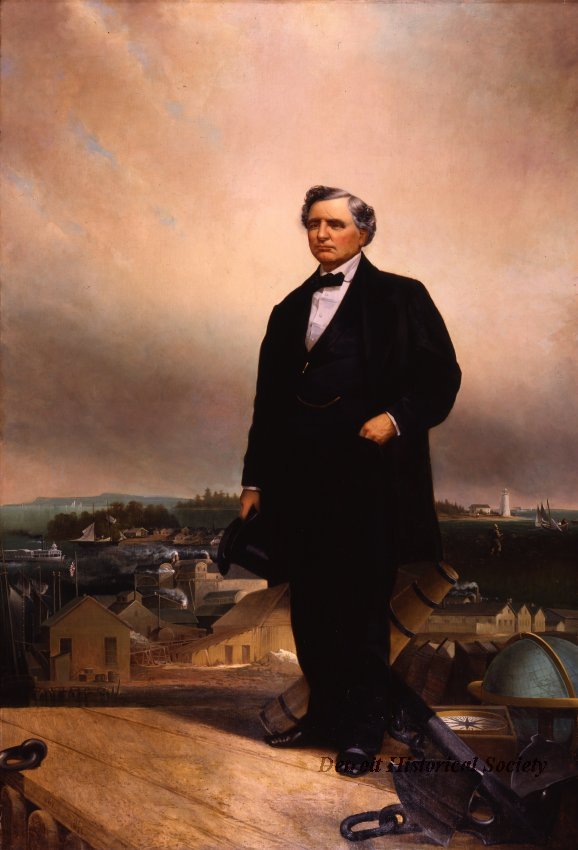Eber Brock Ward was an early industrialist in Detroit during the 19th century. Ward’s business interests included lumber, steel and shipbuilding and he was among the first to exploit Michigan’s abundant natural resources for use in heavy industry. As a result of Ward’s many initiatives Detroit became a major industrial center and he became a millionaire.
Eber Brock Ward was born in Waterloo, Ontario on December 25, 1811 to American parents. His family arrived in Detroit in 1821. Soon after, Ward began working as a cabin-boy on his uncle Sam Ward’s trading ship, eventually becoming captain of his own trading ship, the Huron, and then a partner in his uncle’s shipping business at Marine City, Michigan.
In 1850, the Wards moved their operations to Detroit, and became the largest shipbuilders on the Great Lakes, bringing both freight and passengers to the growing region. In 1853, Ward established the Eureka Iron Works at present-day Wyandotte. Using his own ships, Ward transported raw ore from the Upper Peninsula to his plant where the iron produced would be used by nearly all of the industries in Detroit. Recognizing the importance of iron ore discovered in the Upper Peninsula, Ward supported the construction of the Soo Locks, though he objected to the 350-foot length of the locks, saying that the channels of the St. Mary River could not support ships of that size. One of his ships was the first to pass through the locks.
Eureka Iron Works was first in the United States to successfully use the Bessemer process in steel making, allowing steel to be efficiently mass produced. The abundance of raw materials being transported by Ward’s ships made the Eureka plant one of the largest iron mills in the nation, and Ward became the richest man in the Midwest and Detroit’s first millionaire, also helped by inheriting his uncle Sam Ward’s business upon his death in 1854.
While he built his manufacturing empire in Detroit, Ward invested heavily in other industries. He purchased over 70,000 acres of forest and constructed lumber mills near Ludington, quickly becoming one of the leaders in the logging industry. In 1860, Ward became president of the Flint and Pere Marquette Railroad, saving the company from bankruptcy and allowing transportation of his lumber to remain under his own control.
Ward created an industrial empire throughout Michigan, with raw resources, transportation and manufacturing all under his control. Lumber would be transported to his shipbuilding sites, which would in turn move raw ore to his steel mill, which would complete the circle by building equipment and machines for his lumber mills, as well as rails for his railroad.
Though Ward established other mills at Chicago and Toledo, Detroit remained his center of operation. Ward remained active managing his many endeavors until his death on January 2, 1875 when he suffered a stroke on the streets of Detroit. Though many of his businesses failed after his death, his importance as one of Detroit’s first industrialists remained long after.
Ward was married twice. He married Maryell McQueen in 1837 and they had seven children. He divorced in 1869 to marry the much younger Catherine Lyon, with whom he had two children. During his life, Ward was an active philanthropist, donating large amounts of money to various cultural and social institutions.
